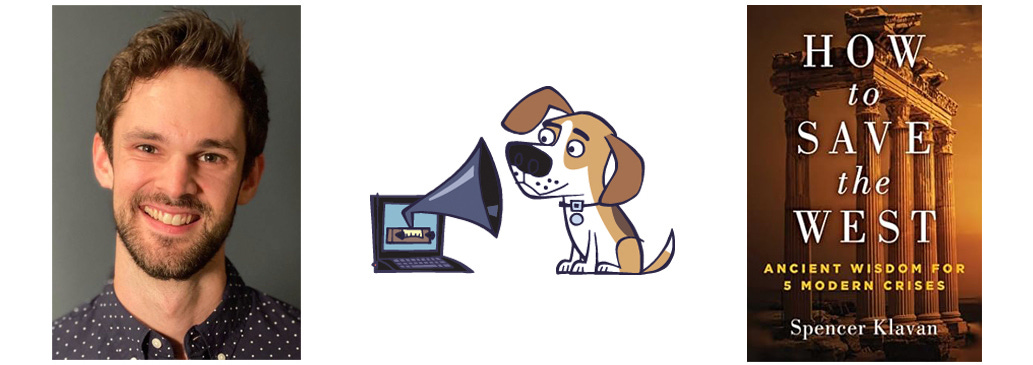Spencer is a writer and podcaster. He’s currently an associate editor at the Claremont Review of Books and the host of the “Young Heretics” podcast. He’s also the author of How to Save the West: Ancient Wisdom for 5 Modern Crises and the editor of Gateway to the Stoics. You can follow his latest writing on Substack.
You can listen to the episode right away in the audio player above (or on the right side of the player, click “Listen On” to add the Dishcast feed to your favorite podcast app). For two clips of our convo — on finding God in the humanities, and why so many gays throughout history have been drawn to the Church — pop over to our YouTube page.
Other topics: Spencer’s upbringing in NYC and London and elsewhere; his rigorous schooling in Britain; his dad the prominent novelist; his lapsed Catholic mom and lapsed Jewish dad; Spencer as a teen converting to Christianity — “conversational, not doctrinal”; coming to terms with his homosexuality; Yale for undergrad and Oxford for a PhD in the Classics; his initial calling as an actor; learning Latin and ancient Greek; how the Greeks had two words for forgiveness; the Gospels; Aquinas; the Scientific Revolution; how evolution is compatible with Christianity; James Madison; Tocqueville; the suffering that brings one closer to God; the waning of both the humanities and religion in American life; climate doomerism; postmodernism; Judith Butler; the transing of gender-dysphoric kids; Alasdair MacIntyre; and how genetics is “necessary but not sufficient” for seeking truth.
Browse the Dishcast archive for another convo you might enjoy (the first 102 episodes are free in their entirety — subscribe to get everything else). Coming up: David Brooks on his new book How to Know a Person,” his fellow NYT columnist Pamela Paul, and the authors of Where Have All the Democrats Gone? — John Judis and Ruy Teixeira. Also: David Leonhardt, Cat Bohannon, and McKay Coppins.
Have a question you want me to ask one of those future guests? Email dishpub@gmail.com, and please put the question in the subject line. Send any guest recs, pod dissent and other comments to dish@andrewsullivan.com.
Here’s a listener on last week’s episode with Martha Nussbaum:
I appreciate the number of guests you interview about animal welfare. It’s an important issue. My concern with your latest guest’s perspective is that she seems to fall into the trap of anthropomorphizing non-human animals. For example, she talked about spaying female cats the way one would talk about family planning for women. She thinks cats should be provided with contraception because raising multiple litters of kittens could be too exhausting for them — but, they should be permitted to have at least one litter of kittens so they can fulfill their potential as cats.
But why just one litter? Why not two litters? Why not no litters at all? Does your guest really know what cats need for fulfillment? I doubt that cats know. I doubt that cats even contemplate this question. Even if cats do contemplate this question, they don’t seem to be able to express their conclusions or preferences to us humans in any actionable sort of way.
Sadly, in a state of nature, there’s no family planning. Excess population is managed with mass starvation and predation. Life in the wild has always been, and will always be, “poor, nasty, brutish and short.”
I take your point. But there are ways in which humans can help wild animals. Take the Sheldrick Trust: it rescues orphaned and wounded and assaulted elephants and rhinos. And Martha’s point is not that cats and humans have the same rationality or feelings; but that cats obviously have life goals of a sort, and we can help them realize them.
We also talked rats and contraception:
Another fan of the episode:
I enjoyed your convo with Martha Nussbaum and I’m delighted to see you exploring this challenging subject. But I was surprised to hear her say that parrots are “solitary” and thus fare fine in labs. Perhaps some species are exceptions, but parrots are generally intensely social, living in flocks that share much with elephant troupes in forming strong, often lifelong, monogamous pair bonds. This has come home as I’ve watched one of my daughter’s formerly two conures grieve and, as they say, “act out” after his (male) companion died. He’s become conspicuously needy and emotionally dependent on her. Perhaps parrots’ ability to bond with humans helps them endure laboratory isolation.
Huh. Martha and I also talked fish:
This next listener is “thankful for this episode on animal suffering and humanity’s part in it”:
For what it’s worth, I’m that annoying guy who gave up red meat, back in college in 1992. My father, a British diplomat, was posted to Brazil at the time and I was very aware of deforestation in the Amazon. Waiting for my plane back to Heathrow, and so Oxford, in those pre-iPhone days I used to shuffle around the bookshop in São Paulo’s airport, reading magazines I had no intention of buying. I came across a Newsweek article saying that the largest contributor to deforestation was cattle ranching. At the time I thought lumber was the problem.
I hummed and hawed over quitting meat, but a friend who knew I adored Big Macs bet me that I couldn’t quit, so I did, at the start of my summer term.
I told myself various comforting things about chicken, principally for laughs — the main one being that if you could cut the chicken’s head off and the body could still run round the farmyard for 20 seconds, there clearly wasn’t that much in the head to begin with. I, of course, knew this was hollow, and always intended to revisit the decision once my choice was more mainstream. I did so 20 years later, after a video someone showed me: “free range” chickens being — and there is no other way to describe this — vacuumed up in a transparent tube, with rotating plastic arms capturing chickens trying desperately to get out of the way. The live chickens were ejected from the tube and placed into trays by people dressed as if in Intel chip fab bunny suits. This was cold, clinical, and I think worse because this was the “ideal” form of industrial death.
I could not be a part of that. I do miss chicken (masala!), but I can’t unsee that video.
I am a little more equivocal about fish. I don’t feel a sense of outrage or even sadness at the death of an individual fish. After all, very few fish die of old age. What I struggle with is with the mass destruction of dragnets and other forms of industrialised fishing, laying waste to sections of the ocean floor. Fish remains my go-to zone of compromise.
In 2123, we will have manufactured proteins. I am convinced that those people will look back on the way we treat animals in ways essentially indistinguishable from how we think about slavery today.
I suspect the same thing. But my flesh is weak. Next up, a guest recommendation:
I became a subscriber recently and very much enjoy listening to the Dishcast. You may want to consider inviting on Meir Soloveichik. He is an American Orthodox rabbi and a brilliant thinker on topics at the nexus of Jewish and non Jewish philosophy. His work is widely published in magazines and newspapers that I have a lot of respect for.
Another rec:
John Podhoretz, please! First, his command of the media/cultural landscape and political history can (almost!) rival yours. Second, he’s the perfect candidate with whom you can explore the Israel/Gaza catastrophe and the state of Zionism. Finally, he’s funny. Book the man!
JPod! The thing is, I don’t think on the Israel/Gaza question, JPod is willing to explore anything.
On the Palestinian side:
I would talk to Tareq Baconi, who has an interview in The New Yorker with Isaac Chotiner. He’s the author of Hamas Contained: The Rise and Pacification of Palestinian Resistance.
That title hasn’t aged well though, has it? Another:
The Arab Israeli journalist, Khaled Abu Tomeh, may be an interesting choice for you. He’s Palestinian and lives in East Jerusalem, but he is quite willing to be critical of the PA and even his own people when he feels it is warranted. I suspect he’s considered an outlier by some, but his critique has the benefit of coming from one who is deeply informed and lives the context about which he opines. I’ve met with him before, but it has been many years, and my recollection is that his English is very good.
I definitely want to find a Palestinian. One more reader with recs:
Thought I’d reach out with a few suggestions for Palestinians you might invite on the pod, as I do try to read and follow as many of the Palestinians as possible — both pro 2-state and anti-Zionist:
Mohamad Jamous, a relatively moderate Palestinian peace activist.
Any of the Palestinians featured on The Sulha, a channel for discussion between Israelis and Palestinians (whose videos you would greatly enjoy).
Or, if you would like an Israeli Arab, consider:
Mansour Abbas, an Arab member of the Israeli Knesset who made history last year in many ways.
Muhammad Zoabi, a very well spoken, pro 2-state, gay, Arab-Palestinian-Israeli activist.
Here’s a reader taking issue with my latest column:
I must dissent from the conclusion of your heartfelt piece on the Israel-Palestine tragedy: “There is no future for Israel without a state for the Palestinians, however hard that may be.” On the contrary, there is no future for the state of Israel if there is a state of Palestine.
You wrote in your 2017 essay “America Wasn’t Built for Humans” that tribalism is the default setting of human nature. Twenty years ago, during the Second Intifada, I was teaching at Yeshiva University and still believed a two-state solution was possible. Several of my very intelligent, committed, and Talmud-trained students disagreed with me. They called for the ethnic cleansing of the Palestinians. Presenting the conflict in existential tribal terms, they said: “This is a war for survival. It’s Us or Them. Either we push them over the Jordan, or they push us into the sea. There is no middle ground.”
I have come to understand the logic of their position. At one time I shared your concern and anguish over the tragic history and unjust fate of the Palestinians. I no longer do.
Listen to this episode with a 7-day free trial
Subscribe to The Weekly Dish to listen to this post and get 7 days of free access to the full post archives.













